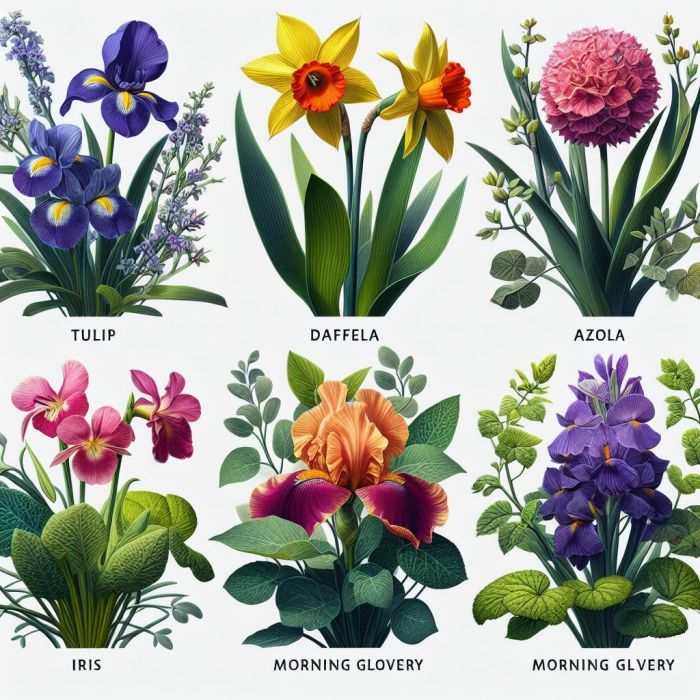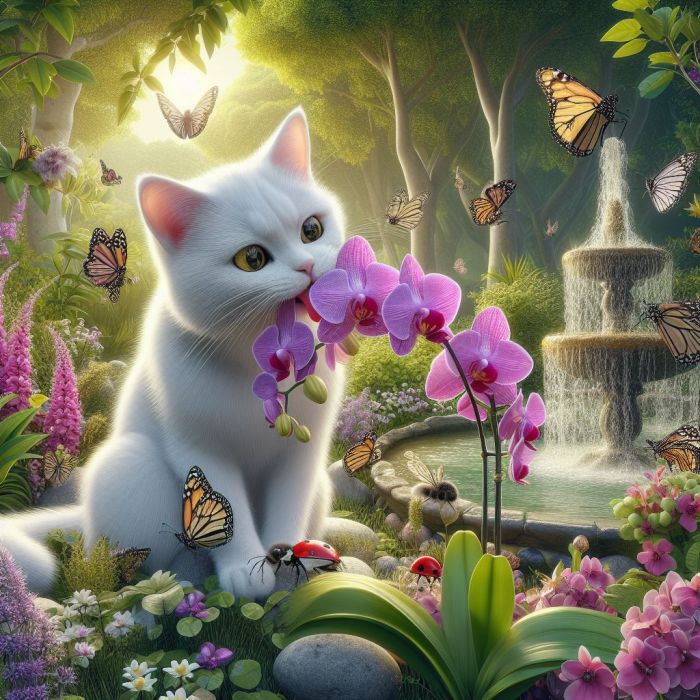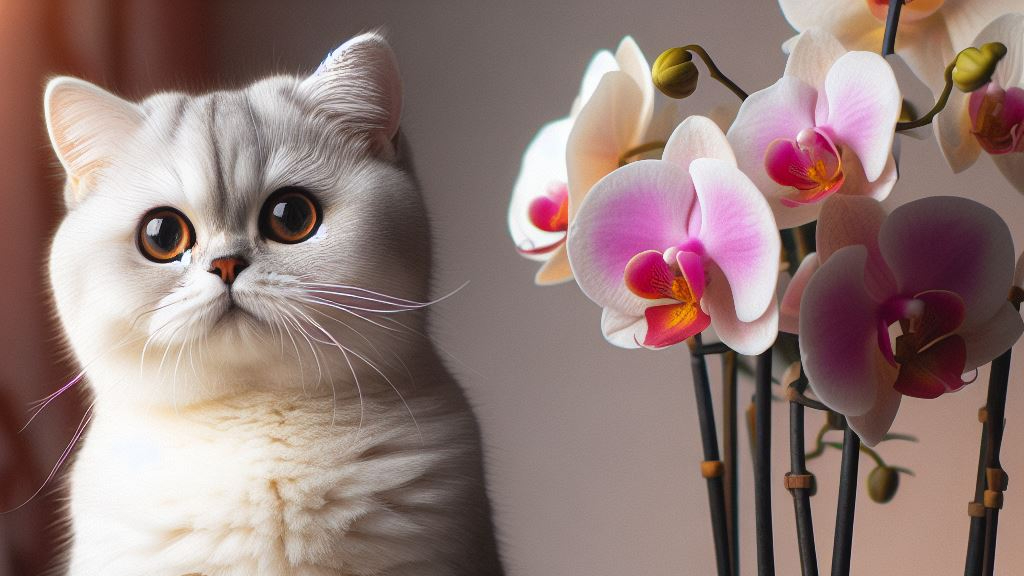Last updated on March 8th, 2024 at 05:44 am
Are orchids toxic to cats? Orchids are well known for their beauty and lovely scent, making them a favorite among plant lovers everywhere. They’re often chosen to decorate homes and gardens, adding a touch of elegance to any space. However, despite their allure, cat owners should be aware that some orchids are toxic to cats, presenting a potential hazard if ingested by our furry companions.
For people who love both their pets and plants, the question of whether orchids are harmful to cats is important. With so many types and species to choose from, orchids offer plenty of options for plant enthusiasts. But even though most orchids aren’t poisonous to cats, it’s still vital to be cautious. We need to keep a close eye on our curious pets and take steps to make sure they stay safe around these beautiful flowers.
Contents
Are Orchids Toxic to Cats:

Cat owners need to research which specific types of orchids are toxic to their feline friends, as ingestion can lead to various health issues. By being aware of potential risks, pet owners can ensure a safe and harmonious environment for both their beloved cats and their cherished plants.
Are Orchids Toxic to Cats: Keeping Cats Safe Around Houseplants
Assessing the Risk: Orchids and Cat Safety
Certainly, specific varieties of orchids can present a danger to cats if they consume them. The level of risk varies based on the particular orchid species and the amount ingested by the cat. Although not all orchids threaten cats, it’s essential to identify those that could potentially cause harm to ensure the safety of our feline companions.
Can orchids pose a danger to cats?
While orchids themselves don’t contain substances or chemicals considered toxic to cats, it’s crucial to recognize that ingestion of any plant material may upset a cat’s stomach. Thus, even though orchids aren’t inherently dangerous, it’s wise to discourage cats from nibbling on them or any other plants they may find appealing to prevent potential health issues.
Understanding Plant Toxicity: Risks to Cats from Common Flowers

1. Tulip:
Although not as toxic as true lilies, tulips contain compounds that can cause gastrointestinal issues and more severe symptoms if ingested by cats. Cat owners should be cautious of the potential risks and ensure tulips are kept out of reach of their pets.
2. Lily:
When talking about whether are orchids toxic to cats, despite their enchanting appearance, lilies are highly toxic to cats. Even minimal exposure to pollen or plant material can result in severe kidney damage, making it imperative for cat owners to avoid having lilies in their homes or gardens.
3. Azalea:
Azaleas contain grayanotoxins, which can affect the heart muscles, leading to a dangerously slow heart rate in cats. Ingestion of any part of the plant can cause severe toxicity, requiring immediate veterinary attention. It’s advisable to avoid planting azaleas in areas accessible to cats.
4. Daffodil:
Daffodils contain toxic compounds that can induce gastrointestinal upset, lethargy, and heart issues in cats. The bulbs are particularly hazardous, necessitating caution when planting daffodils to prevent access by pets.
5. Aloe:
While Aloe vera is beneficial for humans, it can cause vomiting, diarrhea, and lethargy in cats if ingested. Cat owners should refrain from keeping aloe plants indoors or in areas their pets can access to prevent accidental ingestion.
6. Iris:
Irises can lead to various symptoms in cats, including skin irritation, gastrointestinal upset, and mouth ulcers. Cat owners should exercise caution when planting irises and ensure their pets cannot come into contact with them.
7. Primrose:
Despite being less toxic compared to other plants, primroses can still cause vomiting and gastrointestinal upset in cats if ingested. Cat owners should monitor their pets around primroses and seek veterinary advice if ingestion occurs.
8. Morning Glory:
Ingestion of morning glory seeds can induce hallucinations in cats, although the plant is generally considered mildly poisonous. Cat owners should take measures to prevent their pets from accessing morning glory plants to avoid any potential adverse effects.
Are Orchids Toxic to Cats? Identifying Symptoms

- Vomiting:
Cats may exhibit sudden and repeated episodes of vomiting, often after exposure to a toxic orchid.
- Diarrhea:
Loose or watery stools may occur concurrently with vomiting, signaling potential orchid poisoning.
- Drooling:
Excessive salivation or drooling beyond normal levels can be indicative of ingestion of a toxic substance found in orchids.
- Lethargy:
Affected cats may display a noticeable lack of energy or enthusiasm for activities they typically enjoy.
- Loss of Appetite:
A diminished interest in food or refusal to eat may accompany other symptoms, reflecting underlying illness.
- Difficulty Breathing:
In severe cases of orchid toxicity, cats may experience labored breathing or respiratory distress, which warrants immediate attention.
- Increased Heart Rate:
Tachycardia, or an elevated heart rate, may be present and should be monitored closely as a potential sign of poisoning.
If you suspect your cat has ingested a toxic orchid or shows any unusual symptoms, seek immediate veterinary attention to ensure proper diagnosis and treatment. Early intervention is crucial for a favorable outcome.
Protecting Your Feline Friends: Precautions Against Orchid Toxicity
Are orchids toxic to cats, yes orchids are toxic to cats, and cat owners need to take proactive measures to safeguard their pets from potential harm. Here are some precautions to consider:
Choose Safe Orchid Varieties:
Opt for orchid species known to be non-toxic to cats, such as phalaenopsis orchids (Phalaenopsis spp.) or Miltonia orchids (Miltoniopsis spp.). These safer options can still enhance your living space without posing a risk to your furry companions.
Place Orchids Out of Reach:
Given that some orchids can be harmful to cats, it’s crucial to keep them in elevated locations or rooms inaccessible to your pets. Placing toxic orchids out of reach reduces the likelihood of accidental ingestion and minimizes the risk of toxicity.
Monitor Your Cats:
Keep a vigilant eye on your cats, especially when they are near orchids or other houseplants. Discourage them from nibbling on leaves or flowers, as even a small amount of ingestion can lead to poisoning. Promptly remove any fallen petals or debris that may attract their curiosity to further mitigate the risk.
FAQs:
Are orchids toxic to cats?
Yes, some varieties of orchids can be toxic to cats if ingested. While not all orchids pose a threat, cat owners need to research and identify which specific types may present a hazard to their feline companions.
What should I do if my cat eats an orchid?
If you doubt that your cat has ingested a toxic orchid, seeking immediate veterinary attention is crucial. Even small amounts of ingestion can lead to serious health complications, so prompt evaluation and treatment are necessary for your cat’s well-being.
How can I prevent my cat from eating orchids?
To prevent accidental poisoning, consider placing orchids in high locations or rooms that are off-limits to your pets. Additionally, keep a close eye on your cats when they are near orchids and promptly remove any fallen petals or debris that may attract their curiosity.
In conclusion, while orchids can add elegance and charm to any living space, certain varieties can be toxic to cats if ingested. Cat owners need to be informed about the potential risks and take necessary precautions to prevent accidental poisoning. By choosing safe orchid varieties and keeping toxic plants out of reach, you can create a beautiful and pet-friendly environment for both you and your beloved feline companions. Are Orchids Toxic to Cats? By implementing these precautions and staying informed about the potential dangers of orchids to cats, you can create a safer environment for your pets while still enjoying the beauty of these exquisite flowers in your home.

